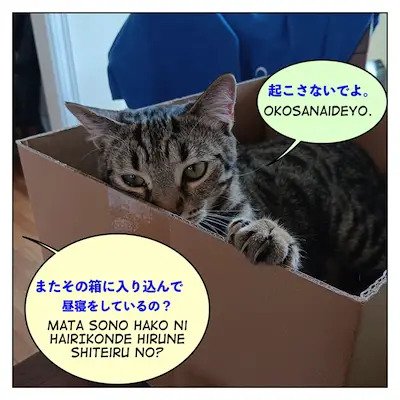
「猫はチェスが出来ないと思い込んでいるでしょ。」
= ねこはチェスができないとおもいこんでいるでしょ。
= Neko wa chesu ga dekinai to omoikonde iru desho.
= You think cats can’t play chess, don’t you?

「またその箱に入り込んで昼寝をしているの?」
= またそのはこにはいりこんでひるねをしているの?
= Mata sono hako ni hairikonde hirune wo shite iru no?
= Are you getting into that box and taking a nap again?
「起こさないでよ。」
= おこさないでよ。
= Okosanai deyo.
= Don’t wake me up!
Hi everyone! I’m your guest teacher today — Pepper. And yes, I’m an excellent chess player.
毎日チェスで遊んでいます。
= まいにちチェスであそんでいます。
= Mainichi chesu de asonde imasu.
= I play chess every day. ♟️
Today’s lesson is about compound verbs that use 込む ( = こむ). In a previous lesson, we looked at many compound verbs.
I introduced ~込む (=こむ = komu) and mentioned that it has a variety of uses, and I told you I would make a special lesson just for 込む( = こむ= komu) someday.
And that day is today! 😉
This time, we’ll take a closer look at the different meanings and uses of ~込む.
First, let’s quickly review how to form a compound verb by combining two verbs:
The first verb (masu-stem) + the second verb.
By combining two verbs, you can create a new verb that reflects the meaning of both.
⭐️verb masu-stem + 込む ( = こむ = komu)
Ex. 思います = おもいます= omoimasu = to think
masu-stem (delete ます= masu)
→ 思い ( = おもい = omoi) + 込む ( = こむ = komu)
= 思い込む= おもいこむ = omoikomu = to be convinced / to assume (strongly)
⭐️ noun form: ~ 込み = こみ = ~ komi
→思い込み = おもいこみ = omoikomi = assumption / bias
OK, now let’s learn about various uses of 込む (こむ = komu) as a compound verb
and as well as the noun form 込み (こみ = komi).
Since this is a long lesson (as always), please use the index below with links if you need to jump directly to the usage you want to check. ⬇️
🔸1) To do something thoroughly or intensely.
Emphasizes effort, depth, or intensity of an action.
🔸3) To use something for a long time / To use something repeatedly
🔹(A) Transitive: 〜を = wo ( + 〜に = ni) + verb: to put something into some place / situation / system
****
1) To do something thoroughly or intensely.
Emphasizes effort, depth, or intensity of an action.
* 買い込む = かいこむ = kaikomu = to buy a lot of something (buying in bulk)
Ex. 野菜が安かったのでスーパーでたくさん買い込んだ。
= やさいがやすかったのでスーパーでたくさんかいこんだ。
= Yasai ga yasukatta node suupaa de takusan kaikonda.
= The vegetables were cheap, so I bought a bunch at the supermarket.

* 歌い込む = うたいこむ = to sing intensely / to practice singing thoroughly
(カラオケで = Karaoke de)
Ex. その曲、歌い込んでいるね。
= そのきょく、うたいこんでいるね。
= Sono kyoku, utaikonde iru ne.
= (At Karaoke) You’ve really practiced that song a lot, haven’t you?

* 聞き込む = ききこむ = to listen intently / to listen deeply/ to gather information
by questioning or interviewing people
Ex. 警察は、聞き込み調査を行なって事件の真相を探った。
= けいさつは、ききこみちょうさをおこなってじけんのしんそうをさぐった。
= Keisatsu wa, kikikomichousa wo okonatte jiken no shinsou wo sagutta.
= The police conducted interviews with people involved to uncover the truth
behind the case.
* 仕込む = しこむ = to train / to prepare thoroughly
Ex. 今晩から料理を仕込んでおいた。
= こんばんからりょうりをしこんでおいた。
= Konban kara ryouri wo shikonde oita.
= I started preparing the food from this evening.
* 染み込む = しみこむ = to soak into / to permeate deeply
Ex. シャツにソースが染み込んでしまった。
= シャツにソースがしみこんでしまった。
= Shatsu ni soosu ga shimikonde shimatta.
= The sauce soaked into the shirt.

* 吸い込む = すいこむ = suikomu = to inhale deeply / to absorb completely
Ex. 森の中で、綺麗な空気をいっぱい吸い込んだ。
= もりのなかで、きれいなくうきをいっぱいすいこんだ。
= Mori no naka de, kireina kuuki wo ippai suikonda.
= I took a deep breath of the clean forest air.
* 叩き込む = たたきこむ = tatakikomu = to hammer into (someone’s head)) / to
drill in
Ex. 柔道のクラスで礼儀と作法を叩き込まれた。
= じゅうどうのクラスでれいぎとさほうをたたきこまれた。
= Juudou no kurasu de reigi to sahou wo tatakikomareta.
= They hammered manners and etiquette into me in judo class. (Literally: I
was thoroughly taught manners and etiquette in judo class.)
* 惚れ込む = ほれこむ = horekomu = to be deeply in love with / to be fascinated by
Ex. 彼の生き方に惚れ込んだ。
= かれのいきかたにほれこんだ。
= Kare no ikikata ni horekonda.
= I fell deeply in love with his way of life.
* 飲み込む/呑み込む = のみこむ = nomikomu
1) to swallow / to gulp down
2) to understand something fully / to grasp an idea completely
Ex. この薬は大きいからなかなか飲み込めない。
= このくすりはおおきいからなかなかのみこめない。
= Kono kusuri wa ookii kara nakanaka nomikomenai.
= This pill is big, so it’s hard to swallow.
Ex. その生徒は飲み込み(呑み込み)が早い。
= そのせいとはのみこみがはやい。
= Sono seito wa nomikomi ga hayai.
= That student picks things up quickly.
* 見込む = みこむ = mikomu = to anticipate / to expect confidently
Ex. 今年は、海外から4000万人以上の観光客を見込んでいる。
= ことしは、かいがいからよんせんまんにんいじょうのかんこうきゃくをみこんでいる。
= Kotoshi wa, kaigai kara yonsenmannin ijou no kankoukyaku wo mikonde iru
= This year, we are expecting over 40 million tourists from overseas.
* 読み込む = よみこむ = yomikomu = to read thoroughly / to process (data) / t
load (a file, etc.)
Ex. この漫画は相当読み込んでいるから全ての台詞を覚えている。
= このまんがはそうとうよみこんでいるからすべてのせりふをおぼえている。
= Kono manga wa soutou yomikonde iru kara subete no serifu wo oboete iru.
= I have read this manga thoroughly, so I remember all the lines.
Ex. データが大きいので読み込むのに時間がかかる。
= データがおおきいのでよみこむのにじかんがかかる。
= Deeta ga ookii no de yomikomu noni jikan ga kakaru.
= It takes time to load because the data is large.
(Note: This usage belongs to 4 – A)
* 着込む = きこむ = kikomu = to put on several layers (clothing) thoroughly /
intensely (to dress warmly)
Ex. 寒いからいっぱい着込んで出かけた方がいいよ。
= さむいからいっぱいきこんででかけたほうがいいよ。
= Samui kara ippai kikonde dekaketa hou ga ii yo.
= It’s cold, so you’d better bundle up when you go out.

2) To remain in a state for a long time / To be deeply absorbed or stuck in something. Often expresses a sense of immersion, absorption, or continuation, either mentally, emotionally, or physically.
(Actions/Behavior)
* 打ち込む = うちこむ = uchikomu = to devote oneself to / to concentrate on
(something)/to type (data, text, etc.) into a computer or device.
Ex. 兄は今、ゴルフに打ち込んでいる。
= あにはいま、ゴルフにうちこんでいる。
= Ani wa ima, gorufu ni uchikonde iru.
= My older brother is currently devoted to golf.
* 眠り込む = ねむりこむ = nemurikomu = to fall asleep deeply
Ex. 疲れていたので電車の中で眠り込んでしまった。
= つかれていたのででんしゃのなかでねむりこんでしまった。
= Tsukarete ita no de densha no naka de nemurikonde shimatta.
= I was tired, so I fell into a deep sleep on the train.

* 話し込む = はなしこむ = hanashikomu = to be absorbed in talking
Ex. 気がついたら友達と電話で2時間も話し込んでいた。
= きがついたらともだちとでんわでにじかんもはなしこんでいた。
= Kiga tsuitara tomodachi to denwa de nijikan mo hanashikonde ita.
= Before I realized it, I was fully engaged talking on the phone with my friend for two hours.
* 座り込む / 坐り込む = すわりこむ = suwarikomu = to sit down and refuse to move
Ex. 急にぎっくり腰になり、その場に座り込んで動けなくなった。
= きゅうにぎっくりごしになり、そのばにすわりこんでうごけなくなった。
= Kyuu ni gikkurigoshi ni nari, sonoba ni suwarikonde ugokenaku natta.
= Suddenly, I threw out my back and just sat down there. I couldn’t move at all.
* 煮込む = にこむ =nikomu = to simmer / stew (for a long time)
Ex. 名古屋の味噌煮込みうどんは美味しいですよ。
= なごやのみそにこみうどんはおいしいですよ。
= Nagoya ni misonikomi udon wa oishii desu yo.
= The miso simmered udon in Nagoya is really delicious, you know.

* 黙り込む = だまりこむ = damarikomu = to fall silent / to sink into silence
Ex. 彼に別れようと言ったら黙り込んでしまった。
= かれにわかれようといったらだまりこんでしまった。
= Kare ni wakareyou to ittara damarikonde shimatta.
= When I told him I wanted to break up, he went completely silent.
(Climate/Environment)
* 冷え込む = ひえこむ = hiekomu = to get significantly colder
Ex. 朝晩冷え込んできたので暖かくして過ごしてください。
= あさばんひえこんできたのであたたかくしてすごしてください。
= Asaban hiekonde kita node atatakaku shite sugoshite kudasai.
= It’s been getting chilly in the mornings and evenings, so please stay warm.
(Mental/Emotional)
* 落ち込む = おちこむ = ochikomu = to feel depressed
Ex. 就職試験に落ちてしまったが落ち込んでばかりもいられない。次の仕事を見つけなくては。
= しゅうしょくしけんにおちてしまったがおちこんでばかりもいられない。つぎのしごとをみつけなくては。
= Shuushokushiken ni ochite shimatta ga ochikonde bakari mo irarenai. Tsugi no shigoto wo mitsukenakutewa.
= I failed the job exam, but I can’t stay depressed. I have to find a new job.
* 考え込む = かんがえこむ = kangaekomu = to brood / to be lost in thought / be sunk in thought
Ex. 友達と喧嘩してから考え込んで眠れない日が続いた。
= ともだちとけんかしてからかんがえこんでねむれないひがつづいた。
= Tomodachi to kenka shite kara kangaekonde nemurenai higa tsuzuita.
= Ever since I fought with my friend, I’ve been overthinking things and unable to sleep for days.
* 塞ぎ込む = ふさぎこむ = fusagikomu = to shut oneself in / to become withdrawn
Ex. 息子は、ずっと塞ぎ込んで部屋に引きこもっている。学校で何があったのだろう。
= むすこは、ずっとふさぎこんでへやにひきこもっている。がっこうでなにがあったのだろう。
= Musuko wa, zutto fusagionde heya ni hikikomotte iru. Gakkou de nani ga atta no darou.
= My son has been completely withdrawn and shut himself in his room. I wonder what happened to him at school.

* 思い込む = おもいこむ = omoikomu = to assume (strongly)
Ex. 今日は雨が降っているからてっきり試合は中止になると思っていた。
= きょうはあめがふっているからてっきりしあいはちゅうしになるとおもっていた。
= Kyou wa ame ga futte iru kara tekkiri shiaiwa chuushi ni naruto omotte ita.
= Since it’s raining today, I was sure the game would be canceled.
* 信じ込む = しんじこむ = shinjikomu = to believe blindly
Ex. 子供のころ車庫にお化けがいると信じ込んでいた。
= こどものころしゃこにおばけがいるとしんじこんでいた。
= Kodomo no koro shako ni obake ga iru to shinjikonde ita.
= When I was a child, I firmly believed there was a ghost in the garage.
* 決め込む = きめこむ = kimekomu = to assume firmly / to jump to conclusions / to act as if something is decided
Ex. 皆、その人が悪いと決め込んでいたが実際、彼は何も悪いことをやっていなかった。
= みな、そのひとがわるいときめこんでいたがじっさい、かれはなにもわるいことをやっていなかった。
= Mina, sono hito ga warui to kimekonde ita ga jissai, kare wa nani mo warui koto wo yatte inakatta.
= Everyone assumed he was the bad one, but in reality, he hadn’t done anything wrong.
3) To use something for a long time / To use something repeatedly
* 履き込む = はきこむ = hakikomu = to wear shoes until they are well-worn
Ex. その靴、履き込んでいるね。どれぐらい履いているの?(casual)
= そのくつ、はきこんでいるね。どれぐらいはいているの?
= Sono kutsu, hakikonde iru ne. Doregurai haite iru no?
= Those shoes look really well-worn. How long have you been wearing them?
* 使い込む = つかいこむ = tsukaikomu = to use something for a long time
Ex. 使い込んだ財布の方が使いやすい。
= つかいこんださいふのほうがつかいやすい。
= Tsukaikonda saifu no hou ga tsukaiyasui.
= A well-used wallet is easier to use.
Note: 使い込んだ財布 = つかいこんださいふ = tsukaikonda saifu = a wallet that has been used a lot over time
There is another idiomatic expression which doesn’t mean to use something for a long time.
⬇️
to embezzle / to spend money that was set aside for a certain purpose on something else
Ex. 彼は、会社のお金を使い込んで逮捕された。
= かれは、かいしゃの おかねを つかいこんで たいほされた。
= Kare wa, kaisha no okane wo tsukaikonde taiho sareta.
= He was arrested for embezzling the company’s money.
4) To describe inward movement /To put something into something else (to insert or pack into a space)
(A) Transitive: 〜を = wo ( + 〜に = ni) + verb: to put something into some place / situation / system
* 追い込む = おいこむ = oikomu = to drive someone into a corner / to pressure someone
Ex. そんな状況に彼女を追い込んでしまった会社も悪い。
= そんなじょうきょうにかのじょをおいこんでしまったかいしゃもわるい。
= Sonna juoukyou ni kanojo wo oikonde shimatta kaisha mo warui.
= The company is also to blame for driving her into that situation.
* 払い込む = はらいこむ = haraikomu = to pay in / to make payments on something
Ex. 今月末*までに家賃を払い込んでください。
= こんげつまつ* までにやちんをはらいこんでください。
= Kongetsu matsu* made ni yachi wo haraikonde kudasai.
= Please pay your rent by the end of this month.
Note: *今月末→Or こんげつすえ = kongetsu sue
* 振り込む = ふりこむ = furikomu = to transfer (money) into someone’s bank account
Ex. ATMでは現金で1回に10万円しか振り込めません。
= ATMではげんきんでいっかいにじゅうまんえんしかふりこめません。
= ATM dewa genkin de ikkai ni juumanen shika furikomemasen.
transaction.
* 書き込む = かきこむ = kakikomu = to write in / to fill in
Ex. 申込書に必要事項を書き込んで郵送した。
= もうしこみしょにひつようじこうをかきこんでゆうそうした。
= Moushikomisho ni hitsuyoujikou wo kakikonde yuusou shita.
= I filled in the required information on the application form and mailed it.
* 差し込む = さしこむ = sashikomu = to insert / to plug in
Ex. このケーブルをコンピューターの後ろに差し込んで。
= このケーブルをコンピューターのうしろにさしこんで。
= Kono keeburu wo konpyuutaa no ushiro ni sashikonde.
= Plug this cable into the back of the computer.
Note: It also means “the lights shine in / stream into ~”
Ex. 朝の光が部屋の窓から差し込んできた。
= あさのひかりがへやのまどからさしこんできた。
= Asa no hikari ga heya no mado kara sashikonde kita.
= The morning light streamed in through the window of the room.
This usage of 差し込む ( = さしこむ = sashikomu ) (light streaming in) actually belongs to usage (B) explained later below.
* 仕舞い込む = しまいこむ = shinmaikomu = to put something away (and forget about it)
Ex. 押入れに仕舞い込んでいた古いアルバムを見つけた。
= おしいれにしまいこんでいたふるいアルバムをみつけた。
= Oshiire ni shimaikonde ita furui arubamu wo mitsuketa.
= I found an old photo album that had been put away in the closet.
* 持ち込む = もちこむ = mochikomu = to bring in
Ex. あの店はお酒を持ち込みできるらしい。
= あのみせはおさけをもちこみできるらしい。
= Ano mise wa osake wo mochikomi dekiru rashii.
= I heard that we can bring our own alcohol to that place.
* 引き込む / 引込む = ひきこむ = hikikomu = to pull in / to draw someone in (惹き込む)
Ex. 優秀な選手ならうちのチームに引き込みたい。
= ゆうしゅうなせんしゅならうちのチームにひきこみたい。
= Yuushuuna senshu nara uchi no chiimu ni hikikkomitai.
= If he / she is a good player, I want to get him / her to join our team.
* 取り込む = とりこむ = torikomu = to take in / bring in / absorb / import
Ex. 雨が降ってきたから洗濯物を取り込んで。
= あめがふってきたからせんたくものをとりこんで。
= Ame ga futte kita kara sentaku mono wo torikonde.
= It started raining, so bring in the laundry.
Note: Idiomatic expression:
→取り込み中 = とりこみちゅう = torikomichuu = in the middle of something / being busy
Ex. 今、取り込み中なのであとから電話をします。
= いま、とりこみちゅうなのであとからでんわをします。
= Ima, torikomichuu nanode ato kara denwa wo shimasu.
= I’m in the middle of something right now. I’ll call you later.
📝 This is actually not a compound verb —込む ( = こむ=komu) follows a noun but…
尻込む / 後込む= しりごむ = shirigomu = to flinch /to shrink into oneself/ to shrink back
In this case, 込む is read as ごむ ( = gomu) instead of こむ ( = komu).
Ex. 仕事のオファーを受けたが、残業が必要だと聞いて尻込んで断った。
= しごとのオファーをうけたが、ざんぎょうがひつようだときいてしりこんでことわった。
= Shigoto no ofaa wo uketa ga, zangyou ga hitsuyou dato kiite shirigonde kotowatta.
= I received a job offer, but when I heard overtime was required, I flinched and turned it down.
* 詰め込む = つめこむ = tsumekomu = to stuff / to cram
Ex. たくさんお土産をスーツケースに詰め込みすぎて重量オーバーになった。
= たくさんおみやげをスーツケースにつめこみすぎてじゅうりょうオーバーになった。
= Takusan omiyage wo suutsukeesu ni tsumekomi sugite juuryou oobaa ni natta.
= I packed too many souvenirs into my suitcase and it became overweight.
* 押し込む = おしこむ = oshiomu = to put something into something else by pushing or packing it inside.
Ex. 洋服ダンスに冬服が押し込まれているので一度整理しないといけない。
= ようふくだんすにふゆふくがおしこまれているのでいちどせいりしないといけない。
= Youfukudansu ni fuyufuku ga oshikomarete iru node ichido seiri shinai to ikenai.
= My winter clothes have been crammed into the wardrobe, so I need to sort them out.
* 巻き込む = まきこむ = makikomu = to involve / to drag into
Ex. 自分達の問題に友達を巻き込みたくない。
= じぶんたちのもんだいにともだちをまきこみたくない。
= Jibuntachi no mondai ni tomodachi wo makikomitaku nai.
= I don’t want to drag my friend into our problem.
* 申し込む = もうしこむ = moushikomu = to apply for / to request
Ex. 夏期講習に参加したい人は、6月中に申し込んでください。
= かきこうしゅうにさんかしたいひとは、ろくがつちゅうにもうしこんでください。
= Kakikoushuu ni sanka shitai hito wa, rokugatsuchuu ni moushikonde kudasai.
= If you want to join the summer course, please apply by the end of June.
(B) Intransitive: 〜が ( = ga) /は ( = wa) ( + 〜に ( = ni) ) + verb : something or someone enters or moves (deeply) into a place/situation, to go/move (fully) into something (physically)
* 駆け込む = かけこむ = kakekomu = to rush into (a place/train)
Ex. 駆け込み乗車は危険ですのでやめてください。
= かけこみじょうしゃはきけんですのでやめてください。
= Kakekomi jousha wa kiken desu node yamete kudasai.
= Please don’t rush onto the train at the last moment — it’s dangerous.
* 割り込む = わりこむ = warikomu = to interrupt / to cut in (line)
Ex. レジで並んで待っていたら割り込みされた。
= レジでならんでまっていたらわりこみされた。
= Reji de narande matte itara warikomi sareta.
= I was waiting in line at the register when someone cut in front of me.

* 吹き込む = ふきこむ = fukikomu = to blow into / to inspire
Ex. 風が窓の隙間から吹き込んできた。
= かぜがまどのすきまからふきこんできた。
= Kaze ga mado no sukima kara fukikonde kita.
= The wind blew in through the gap in the window.
* 住み込む = すみこむ = sumikomu = to live somewhere as a resident employee
Ex. 昔は、裕福な家には住み込みで働くお手伝いさんがいたらしい。
= むかしは、ゆうふくないえにはすみこみではたらくおてつだいさんがいたらしい。
= Mukashi wa, yuufukuna ie niwa sumikomi de hataraku otetsudaisan ga ita rashii.
= I heard that in the past, wealthy families had live-in helpers.
* 滑り込む = すべりこむ = suberikomu = to slide into
Ex. 滑り込みセーフ (colloquial)
= すべりこみセーフ
= Suberikomi seefu
= I just made it at the last minute.
(Note: Originally a baseball term meaning to slide into a base just before being tagged out.)

* 飛び込む = とびこむ = tobikomu = to jump into
Ex. 子供達はプールに飛び込んだ。
= こどもたちはプールにとびこんだ。
= Kodomotachi wa puuru ni tobikon da.
= The children jumped into the pool.
* 溶け込む = とけこむ = tokekomu = to blend into / to assimilate
Ex. 新しい職場になかなか溶け込むことができない。
= あたらしいしょくばになかなかとけこむことができない。
= Atarashii shokuba ni nakanaka tokekomu koto ga dekinai.
= It is hard to fit in at my new workplace.
* 潜り込む = もぐりこむ = mogurikomu = to sneak in / to crawl or creep under
Ex. 子猫がソファーの下に潜り込んでいる。
= こねこがソファーのしたにもぐりこんでいる。
= Koneko ga sofaa no shita ni mogurikonde iru.
= The kitten is hiding under the sofa.
* 流れ込む = ながれこむ = nagarekomu = to flow into / to stream into / to pour in
Ex. 川の水が海に流れ込む
= かわのみずがうみにながれこむ
= Kawa no mizu ga umi ni nagarekomu.
= The river water flows into the sea.
* 突っ込む = つっこむ = tsukkomu = to plunge/dash into a place
Ex. 車が人混みに突っ込むのを目撃した。
= くるまがひとごみにつっこむのをもくげきした。
= Kuruma ga hitogomi ni tsukkomu no wo mokugeki shita
= I witnessed a car plowing into a crowd of people.
Note: This verb is also used in comedy.
→to make a sharp / funny remark in reaction to something silly (often in a comedy duo or in casual conversations)
(Casual speech)
Ex. 笑いをとろうと面白い帽子かぶってきたのに誰も突っ込んでくれなかった。
= わらいをとろうと おもしろい ぼうし かぶってきたのに、だれも つっこんでくれなかった。
= Warai wo torou to omoshiroi boushi kabutte kita noni daremo tsukkonde kurenakatta.
= I wore a funny hat to get a laugh, but no one reacted or made a comment about it.
In casual speech, you tend to drop particles.
帽子を = ぼうしを = boushi wo
→ (Dropping a particle を = wo ) 帽子 = ぼうし = boushi
Related words:
ツッコミを入れる = ツッコミをいれる = tsukkomi wo ireru
ツッコミ = tsukkomi = the “straight man” in a comedy duo
→ the person who makes a sharp or corrective remark to the ボケ (“funny man” who says something silly)
* 忍び込む = しのびこむ = shinobikomu = to sneak into (somewhere quietly and secretly)
Ex. マギー:誰かが留守中に忍び込んで私のおやつを食べてしまった。 😤
= マギー:だれかがるすちゅうにしのびこんでわたしのおやつをたべてしまった。
= Maggie: Darekaga rusuchuu ni shinobikonde watashi no oyatsu wo tabete shimatta.
= Maggie: Someone sneaked in while I was away and ate my snack.
* 入り込む = はいりこむ = hairikomu = to go into / to crawl into / to get into deeply / to squeeze into
Ex. 知らない道に入り込んでしまった。
= しらないみちにはいりこんでしまった。
= Shiranai michi ni hairikonde shimatta.
= I ended up on an unfamiliar road.
* 踏み込む = ふみこむ = fumikomu = to step deeply into something (someone’s space or a topic or field)
Ex. 人の家に土足で踏み込んではいけない
= ひとのいえにどそくでふみこんではいけない
= Hito no ie ni dosoku de fumikonde wa ikenai.
= You must not enter someone’s house with your shoes on.
Ex. 一歩踏み込んだ質問
= いっぽふみこんだしつもん
= Ippo fumikonda shitsumon.
= A question that goes one step deeper
****
 マギー先生より = Maggie Sensei yori = From Maggie Sensei
マギー先生より = Maggie Sensei yori = From Maggie Sensei
Pepper先生、ありがとう🩷
= Pepper Sensi arigatou
= Thank you, Pepper-Sensei.
みんな、このレッスンで「込む&込み」の使い方を頭にしっかり詰め込んでくださいね。
= みんな、このレッスンで「こむ&こみ」のつかいかたをあたまにしっかりつめこんでくださいね。
= Minna, kono ressun de “Komu & Komi” no tsukaikata wo atama ni shikkari tsumekonde kudasaine.
= You all make sure to really cram the usage of ‘komu’ and ‘komi’ into your heads with this lesson, OK?
****
My Patrons can access the audio file
Audio Files for this lesson →Click here
PDF file without ads (One with romaji & One without romaji) →Click here
I appreciate your support! サポートありがとう! !
My supporters can access tons of audio files, PDF files, and special lessons on my Patreon page.
❤️ありがとう x 2: Mini lessons, PDF files with audio for all the lessons here from 2018
❤️ありがとう x 5 In addition to the previous benefit + Daily Japanese
Check the index of Daily Japanese Series →Index
❤️ありがとう x 10 In addition to the previous benefit + PDF file of all my Twitter lessons for a month (average 10 ~ 18 pages) with an audio file. Please check the details here
One-time support ↓ ありがとう!


